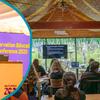Every week is a good week to celebrate and shout about the unique conservation education work carried out in zoos, aquariums and safari parks across the UK (and further afield). On Love Your Zoo week it is necessary to shout that little bit louder!
First of all, let me introduce myself. My name is Adam Welsh and I am the head of education at Five Sisters Zoo in Scotland. For as long as I can remember I have loved the zoo. As a child, I couldn’t sleep if I knew that was where I was going the following day. A trip to the aquarium was just as special and once a year (on or around opening weekend each spring) my grandparents would take me to our closest safari park. I loved these visits so much that my parents had to pretend we were going somewhere else as I became so insufferable, hyper and (on a couple of occasions) unwell due to the excitement.
I was lucky. Lucky to have access to wonderful zoos, aquariums and safari parks, lucky that my family had the means to make these visits possible and lucky that these visits went on to form the foundations of what has, so far, been a rewarding whirlwind of a career for me. Starting as an animal care volunteer seventeen years ago, I have worked as a junior zookeeper, held a field research position, studied a lot and slowly but surely made my way into the wonderfully unique world of zoo conservation education. Now I love zoos for a different set of reasons.
We live in what could be perceived as rather gloomy times. In the midst of huge declines in biodiversity we have ourselves a climate emergency and just when we are getting our heads around this we have a global pandemic to shake things up further. Turning the news on in the morning can make it seem like it is already too late for some of the incredible wildlife we live alongside.
This where the unique power of zoo education can save the day.
Rarely, do people visit or engage with a zoo, aquarium or safari park to be sad. In my experience, most people I see around my own place of work arrive feeling positive and ready for a great day. It is this positivity that can be harnessed, encouraged and steered towards conservation action. Zoo and aquarium educators make sure we don’t waste a huge opportunity to get people to help wildlife, the world and themselves.
Zoo educators are powerful science communicators. We help to create a bridge between the world of research and the communities local to (and sometimes far from) our facilities. From the outside, zoo education in action can often look like just a bit of fun. Good educators can make it seem like they have the easiest job in the world. Games with early years visitors, talks in front of excited audiences, designing and creating interpretation, summer camps, animal experiences.
What you don’t always get to see (and what I was blissfully unaware of until I became a zoo conservation educator) is the meticulous planning, the meetings about linking learning programmes to global strategy, the work with conservation partners, the evaluation, the hours spent researching and the days spent at conferences. I am so lucky to have met and worked alongside so many passionate educators that are making zoos, aquariums and safari parks more accessible, engaging with audiences of all ages, abilities and levels of education, and creating an optimistic approach to saving biodiversity and the planet. Zoo educators are some of the best people to take wildlife conservation research to the world. In order to have more conservation success stories we need the support of people and this is how we can get it.
It is important that we love our zoos, aquariums and safari parks. Not just as visitor attractions, not just as research facilities, not just as conservation organisations but also as vital learning hubs. Our educators can be the link between people and wildlife conservation. This love Your Zoo week let’s celebrate how uniquely positive zoo education can be and celebrate the incredible educators that are making a difference.
- Adam Welsh, Head of Education, Five Sisters Zoo
All blogs reflect the views of their author and are not a reflection of BIAZA's positions.
Related Members
-
News
 2.jpg?w=100&h=100&zc=1&f=jpeg&hash=4fcaf58420abe784e6d087105ae3bfce) Rescued Tiger Treated by World -Renowned Wildlife Dentist 5th March, 2026A rescued tiger at Noah’s Ark Zoo Farm in North Somerset has received dental care from a world-renowned wildlife dentist. The dental treatment is…
Rescued Tiger Treated by World -Renowned Wildlife Dentist 5th March, 2026A rescued tiger at Noah’s Ark Zoo Farm in North Somerset has received dental care from a world-renowned wildlife dentist. The dental treatment is… -
News
 Rare North African cheetah cubs born 4th March, 2026The award-winning Yorkshire Wildlife Park is celebrating conservation breeding success with the birth of four cheetah cubs as part of the Endangered Species…
Rare North African cheetah cubs born 4th March, 2026The award-winning Yorkshire Wildlife Park is celebrating conservation breeding success with the birth of four cheetah cubs as part of the Endangered Species… -
News
 Blog: Why Hosting a BIAZA Conference Matters 3rd March, 2026For this week's blog, Chris Eley (Hertfordshire Zoo) recounts the value of hosting a BIAZA event in 2025: In November 2025, we hosted the BIAZA…
Blog: Why Hosting a BIAZA Conference Matters 3rd March, 2026For this week's blog, Chris Eley (Hertfordshire Zoo) recounts the value of hosting a BIAZA event in 2025: In November 2025, we hosted the BIAZA…


